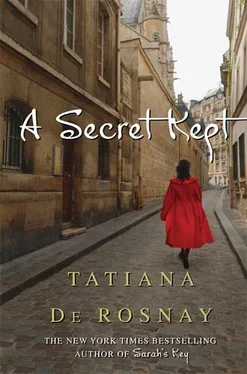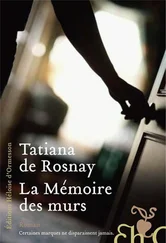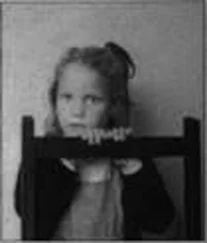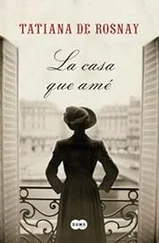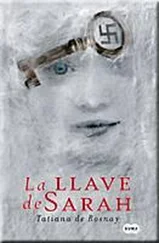I nod, stand up, feeling light-headed. A lump in my throat. The idea of facing the office, Florence, the workload awaiting me seems impossible. I kiss my sister, head to the door, and as I’m about to step out, I turn around and say, “You say you know where to find out.”
“Yes.”
“Where?”
“Blanche.”
Our grandmother. She is right, of course. Blanche must have answers. Some answers. But whether she will want to give us those answers is another matter.

Instead of going to the office, I drive straight home. On my way there, I leave a message for Florence, stating briefly that I won’t be coming in for the rest of the day. I make myself a cup of coffee, light up a cigarette, and sit down at the kitchen table. The lump in my throat is still there. My back aches. I realize how worn-out I am.
Pauline’s dead face keeps wafting back to me. And the vision of what Mélanie revealed. The moonlit room that I did not see but I can all too well imagine. Our mother, her lover. A woman. Am I stunned because my mother was unfaithful, or am I even more shocked because she was bisexual? I’m not sure what upsets me more. And what does Mélanie feel about this, being a woman? Am I less shaken because I imagine a lesbian mother is a softer jolt for a man than having a gay father? A shrink would have a field day with this.
I think about my gay friends, both male and female, Mathilde, Milèna, David, Matthew, and what they told me about their coming out, how their parents reacted. Some parents accepted and understood, others went into total denial. But what do you do, I wonder, when you find out late in life that one of your parents is gay? No matter how open-minded you are, no matter how tolerant, it comes as a bolt from the blue. Especially if that parent is dead and is no longer around to answer your questions.
The front door bangs, and Arno comes loping in, followed by a sullen girl with black lipstick. I can’t make out whether it’s the usual girl or another. They all look the same-goth gear, metallic bracelets, long black clothes. He waves, grins. She barely says hello, stares down at the floor. They go straight to his room. Music blares. A couple of minutes later the door bangs again, and Lucas appears. His face lights up when he sees me. He comes rushing into my arms, nearly knocking my coffee over. I tell him I needed to take a break today, that I left the office. Serious little fellow. He looks so much like Astrid that sometimes it hurts just laying eyes on him. He wants to know when his mother will be back. I tell him Tuesday, for the funeral. I wonder, suddenly, whether the funeral is a good idea for him. Isn’t he too young? Should he be there? He’s only eleven. Pauline’s funeral frightens even me. I ask him gently how he feels about it. He bites his lip. He says that if we are both there, Astrid and me, maybe he’ll feel up to it. I say I’ll talk it over with his mother. His small hand covers mine. His lower lip trembles. This is the first time he is confronted with death. Somebody he knew well, somebody he grew up with, as Pauline had spent countless summers and skiing vacations with us. Someone who was only three years older than he is now.
I try to comfort my son. Am I any good at this? When I was his age, my mother had died and no one had comforted me. Was that why I was useless at reaching out, offering tenderness and support? Are we not forever shaped by our childhood, its scars, its secrets, its hidden pain?
When Saturday comes around, Margaux is still with Patrick and Suzanne. It appears that she needs to be with them, they need to be with her. If Astrid had been here, would our daughter have stayed home? Is she not here because she feels I cannot comfort her, I cannot help her? I hate asking myself these questions, but I feel I need to. I have shied away from them long enough.
Arno goes out, as usual, mumbling something about a party tonight, coming back late. When I mention his low grades, his upcoming report card, that maybe he should be studying instead of partying, he sends a withering look my way, rolls his eyes, and slams the door. I instantly feel like grabbing him by the scruff of his neck and kicking his bony ass down the stairs. I have never hit my children. I have never hit anyone in my life. Does this make me a good person?
Lucas is subdued, and it worries me. I cook his favorite meal, steak, fries, and ketchup, followed by chocolate ice cream. He is even allowed Coca-Cola. I make him promise not to tell his mother. Being such a health food devotee, she would be horrified. For the first time that evening, he finally smiles. He likes the idea of sharing a secret with me. I watch him devour his dinner. We haven’t been alone like this for a very long time. Dealing with Margaux and Arno is a constant battle, a never-ending wrestling match. Easy, flowing moments like these are precious nuggets I want to hoard and cherish.
As last night was a restless one, I decide to go to bed early. Lucas seems tired too, and for once, he doesn’t complain when I suggest sleep. He asks if he can keep his door open and the light on in the hallway. He hasn’t asked that for years. I comply. I sink into bed, praying I won’t be plagued by last night’s images. Pauline’s dead face. Suzanne dressing her daughter’s body. And now will it be my mother in the moonlit bedroom and the stranger in her arms? Surprisingly enough, sleep comes swift and fast.

The phone wakes me, shrill in the dead of night. I fumble for the light, for the receiver. The alarm clock by the bed reads 2:47 a.m.
A man’s voice, curt.
“Are you Arno Rey’s father?”
I sit up in bed, my mouth dry.
“Yes-”
“Commissaire Bruno, police department, tenth arrondissement. You need to come in, sir. Your son is in trouble. As a minor, he cannot be released without your consent.”
“What happened?” I ask, out of breath. “Is he all right?”
“He’s in a sobering-up cell. Yes, he is all right now, but you need to come right away.”
He gives me the address, 26 rue Louis Blanc, and hangs up. I stagger up, put my clothes on mechanically. Sobering-up cell. Does this mean he is drunk? Isn’t that where they put drunk people? Your son is in trouble… What trouble? Should I call Astrid once again in Tokyo? What for? There is nothing she can do where she is now. Oh yeah, comes that inner voice again, that little voice I hate. You’re the one in charge, buddy, you’re the one standing there in the front line. You’re the one who has to go out there into the hurricane, you’re the one who has to face the enemy, that’s your job, buddy, you’re the daddy. You’re the father. Get on with it, man.
Lucas! I can’t leave him, can I? What if he wakes up and finds the place empty? I’ll just have to bring him with me. No, says the inner voice, you can’t bring him. What if Arno is in a terrible state, imagine the damage. He’s already upset by Pauline’s death, you can’t do this. You can’t bring a fragile eleven-year-old into a police station in the middle of the night because his brother is in a drunk tank. Think again, Daddy.
I pick up the phone, dial Mélanie’s number. Her voice is so surprisingly clear that I wonder for a split second whether she was asleep. I briefly explain the situation about Arno. If I leave the key under the doormat for her, can she come over and spend the rest of the night in our apartment? I can’t leave Lucas alone, and there is no one else I can call. She says of course, she’ll be on her way. She’ll take a taxi. Her voice is calm and reassuring.
The police station is somewhere behind the Gare de l’Est, near the Canal Saint-Martin. Paris is never empty on a Saturday night. There are crowds of people strolling along the place de la République and the boulevard de Magenta, despite the cold. It takes me a while to get there, to park. I tell the cop at the door I’m Arno Rey’s father. He nods, lets me in. The place is as run-down and disheartening as the hospital morgue. A small, thin man with pale gray eyes comes up to me and introduces himself. Commissaire Bruno.
Читать дальше
